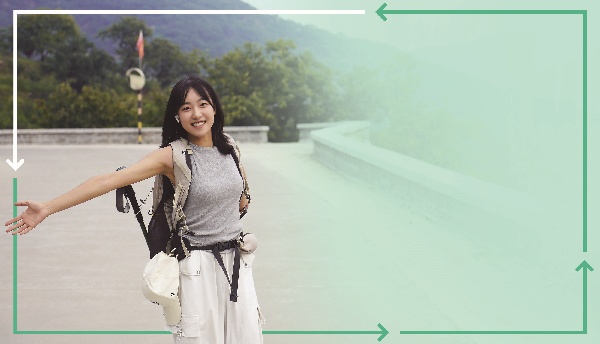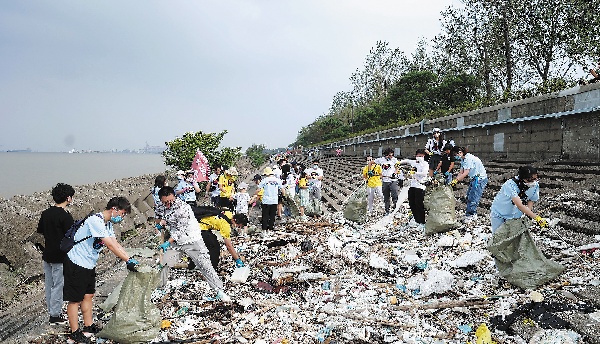Young urbanites in China are embracing sustainable living through rooftop gardens and community efforts, blending eco-consciousness with everyday life.

At an old villa in Guangzhou, Guangdong province, a vine trails from the balcony, bearing a heavy watermelon. To keep it from falling, the garden's owner, Cara (pseudonym), crafted a small hanging basket that cradles the fruit.
In her "edible garden", Cara grows a variety of vegetables, including tomatoes, pumpkins, and eggplants, as well as numerous herbs. It has attracted more than 70,000 followers on the Chinese lifestyle-sharing platform Xiaohongshu (RedNote), particularly young people in their 20s and 30s who share her values on sustainable living.
"I used to buy rosemary in large bundles for cooking but often only needed one sprig," Cara said. "It would end up going to waste. Now, I rarely need to buy spices."
She has observed that many young city dwellers are growing everyday ingredients on their balconies. By adopting simple gardening techniques, they not only enjoy fresh produce but also help reduce waste.
ALSO READ: Pastures of possibility
This garden has also deepened Cara's understanding of environmental protection. At first, she aimed for zero-pesticide organic farming but soon realized this was impractical when pests and diseases appeared.
Instead of giving up on pesticide use entirely, she researched safer options that aligned with her values. She learned that China's strict agricultural regulations ensure that pesticides sold through official channels degrade quickly.
"Sustainability isn't about making life harder," Cara said. "It's about integrating eco-friendly choices into daily routines and finding practical solutions that benefit both people and the environment."

Living with purpose
Sustainable living is gaining traction among more young people like Cara in China, with a noticeable shift from broad environmental campaigns — such as "saving the planet" — to concrete daily actions.
One such advocate is Hu Xinyue, 29, who grew up with green habits long before she fully understood the concept.
"My parents were frugal. Many of the things we still use at home today are the same ones we had when I was a child. But now, sustainability for me is more self-driven — it's no longer just about saving money," she said.
In her daily life, Hu chooses local markets over online shopping, and small neighborhood eateries instead of takeout. She also joined a secondhand exchange group in her neighborhood to swap items with others.
"Living mindfully helped me reconnect with people and see the world differently," she said.
As Hu learned more about sustainability, she discovered that many of her favorite conscious brands carry the "Certified B Corporation" label. This introduced her to the concept of B Corps — businesses certified for positive social impact.
In early 2024, Hu joined B Corps China, hoping to inspire more businesses to adopt responsible practices.
READ MORE: Qinghai rides carpets, culture to new prosperity
"Every day, I follow what I believe in, and working with like-minded people brings me happiness," she said.
Deng Qixuan, 24, has also turned her passion for sustainable living into a career. In May, she joined the Lefen Environmental Protection and Public Welfare Promotion Center in Shanghai. Their key project, Pickup China, tackles outdoor littering.
Deng and her colleagues regularly organize outdoor cleanup events and exhibitions to raise awareness.
"Many people don't fully understand environmental issues," Deng said. "They often see them as remote public concerns, unrelated to their own lives. But disasters affect us all. The conveniences we take for granted can quickly disappear."
She recalled the severe power outages in Sichuan during the summer of 2022, caused by high demand and extreme heat, which strained the region's hydropower supply.
Still, some people remain unconvinced. After a cleanup event, Deng remembered someone asking her, "Trash can never be picked up completely, so why bother?"
"It might seem like picking up trash only addresses the surface problem, not the root cause," she said. "But each piece of trash we remove helps reduce harm — and, more importantly, it inspires participants to start caring for the environment."
Liu Xueli, 23, a volunteer with Pickup China, shared her own eye-opening experience. At her first cleanup event, she was shocked by the amount of litter, much of which she had overlooked during past outdoor activities.
"According to our statistics, about 50 percent of the trash is plastic," Liu said. "Now, I consciously try to cut down on single-use items."
Liu's approach reflects the mindset of a new generation of environmentalists, who see sustainability not as a moral obligation but as a comfortable lifestyle choice.
READ MORE: Preserving Yunnan's rare wild plant species
"Just like some people prefer spending their free time reading or playing video games, mindful living is also about what feels natural and right for you," she said.
Going further
Yang Ran, 38, applies the principles of sustainability not only in his daily life but also at the core of his business.
Over the years, he has seen many eco-conscious startups creating products that, while environmentally friendly, are unnecessary. "They're designed with sustainability in mind, but consumers don't really need them," he said. "This often leads to poor sales and the failure of their original vision."
Now, his team focuses on business consulting, helping companies make strategic ESG (environmental, social, governance) decisions. They especially prefer working with brands led by socially and environmentally conscious founders.
Yang shared an example of a food store that used only organic ingredients and furnished its space with repurposed community furniture. "Mindful business choices may go unnoticed by consumers, but they reduce costs and benefit the environment," he said.
Cara has been pursuing a similar path. In 2021, she founded SeeD, a sustainable living brand that offers eco-friendly products to consumers and green development solutions to businesses.
For the 2023 International Day for Biological Diversity on May 22, Cara organized a special exhibition showcasing various native tomato varieties, many grown in her own garden. "Biodiversity starts on our dining tables," she said. "Many native varieties are disappearing because they're not ideal for commercial farming or transport."
The exhibition attracted more than 20,000 visitors, who sampled tomatoes while exploring the connection between humans and nature.
"Taking care of the environment isn't about saving Earth," Cara said. "Earth doesn't need saving — it will continue on its own. What we need to save is ourselves."


